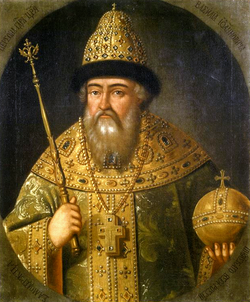Louis II of Soravia
This article is incomplete because it is pending further input from participants, or it is a work-in-progress by one author. Please comment on this article's talk page to share your input, comments and questions. Note: To contribute to this article, you may need to seek help from the author(s) of this page. |
| Louis II | |||||||||
|---|---|---|---|---|---|---|---|---|---|
 Louis holding a sceptre and globus cruciger, c. 1640 | |||||||||
| Emperor of Soravia King of Wittislich | |||||||||
| Reign | 17 January 1616 – 20 August 1655 | ||||||||
| Coronation | 20 January 1616 Samistopol | ||||||||
| Predecessor | Ivan IV | ||||||||
| Successor | Jan IV | ||||||||
| Born | Ludwig Georg von Halte-Herdorf 11 February 1586 Nuruk Palace, Samistopol, Soravia | ||||||||
| Died | 20 August 1655 (aged 69) Meusegast Gardens, Bürchaft, Kingdom of Wittislich | ||||||||
| Spouse | Liliya Honcharova Lipayka | ||||||||
| Issue | Jan IV George William | ||||||||
| |||||||||
| House | Halte-Herdorf | ||||||||
| Father | Ivan IV | ||||||||
| Mother | Alina | ||||||||
| Religion | Episemialist Church | ||||||||
Louis II (Soravian: Людвіг Георг фон Халта-Гердор; Lyudvih Heorh fon Khalta-Herdor, Weranian: Ludwig Georg von Halte-Herdorf, 11 February 1586 – 20 August 1655; aged 69 in Bürchaft), sometimes referred to as Louis the Pious, was Emperor of Soravia and King of Wittislich from 1616 to his death in 1655, a total of 39 years. He was a member of the Weranic House of Halte-Herdorf and ruled the Weranic Kingdom of Wittislich, part of the Ahnemunde Confederation, for the entirety of his reign. He also brought the lands of Miersa under the rule of Soravia after the War of the Miersan Succession.
Son of Emperor Ivan IV, founder of the Soravian Empire, and Queen Alina, Louis was born at the Nuruk Palace in Samistopol. He grew up between Samistopol and Bürchaft in Werania, often travelling between the two, before marrying noblewoman Liliya Lipayka in 1604. A highly religious man, Louis spent much of his time as Crown Prince of Soravia funding and visiting grand cathedrals throughout the country, and was present and the opening ceremony of the Church of the Holy Synod in Bürchaft, one of Werania's largest Episemialist churches. He succeeded to the throne upon the death of his father in 1616.
Compared to his father, Louis was a poor administrator of the country, but used his piety and religion to bring most of the country together, particularly in times of war. He attempted to rekindle the connection between religion and monarchy, which made him popular among Soravia's rural religious populace. He continually claimed sovereignty over Miersa and embarked on the War of Miersan Succession against Gaullican in 1638, eventually splitting the country between the two. Afterwards, Louis embarked on a series of conversions in Miersa, building cathedrals and making public appearances in many of its cities. He also sponsored many colonial ventures, especially religious ones, to Chistovodia and would set the basis for religious institutions in George Ruset Land. Louis continued to rule until 1655, when he became the only Soravian Emperor to die outside of the country when he passed naturally at a summer retreat in the Meusegast Gardens in Wittislich.